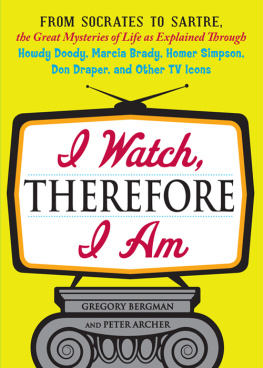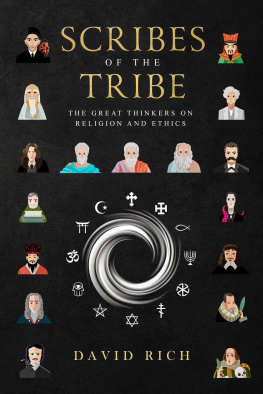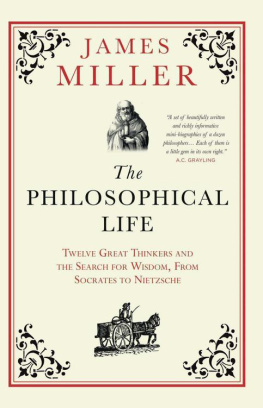Gregory Bergman - I Watch, Therefore I Am: From Socrates to Sartre, the Great Mysteries of Life as Explained Through Howdy Doody, Marcia Brady, Homer Simpson, Don Draper, and other TV Icons
Here you can read online Gregory Bergman - I Watch, Therefore I Am: From Socrates to Sartre, the Great Mysteries of Life as Explained Through Howdy Doody, Marcia Brady, Homer Simpson, Don Draper, and other TV Icons full text of the book (entire story) in english for free. Download pdf and epub, get meaning, cover and reviews about this ebook. year: 2011, publisher: F+W Media, genre: Detective and thriller. Description of the work, (preface) as well as reviews are available. Best literature library LitArk.com created for fans of good reading and offers a wide selection of genres:
Romance novel
Science fiction
Adventure
Detective
Science
History
Home and family
Prose
Art
Politics
Computer
Non-fiction
Religion
Business
Children
Humor
Choose a favorite category and find really read worthwhile books. Enjoy immersion in the world of imagination, feel the emotions of the characters or learn something new for yourself, make an fascinating discovery.
- Book:I Watch, Therefore I Am: From Socrates to Sartre, the Great Mysteries of Life as Explained Through Howdy Doody, Marcia Brady, Homer Simpson, Don Draper, and other TV Icons
- Author:
- Publisher:F+W Media
- Genre:
- Year:2011
- Rating:4 / 5
- Favourites:Add to favourites
- Your mark:
I Watch, Therefore I Am: From Socrates to Sartre, the Great Mysteries of Life as Explained Through Howdy Doody, Marcia Brady, Homer Simpson, Don Draper, and other TV Icons: summary, description and annotation
We offer to read an annotation, description, summary or preface (depends on what the author of the book "I Watch, Therefore I Am: From Socrates to Sartre, the Great Mysteries of Life as Explained Through Howdy Doody, Marcia Brady, Homer Simpson, Don Draper, and other TV Icons" wrote himself). If you haven't found the necessary information about the book — write in the comments, we will try to find it.
Let Gilligans Island teach you about situational ethics. Learn about epistemology from The Brady Bunch. Explore Aristotles Poetics by watching 24. Television has grappled with a wide range of philosophical conundrums. According to the networks, its the ultimate source of all knowledge in the universe! So why not look to the small screen for answers to all of humanitys dilemmas? Theres not a single issue discussed by the great thinkers of the past that hasnt been hashed out between commercials in shows like Mad Men and Leave It to Beaver. So fix yourself a snack, settle into the couch, grab the remote . . . and prepare to be enlightened.
Gregory Bergman: author's other books
Who wrote I Watch, Therefore I Am: From Socrates to Sartre, the Great Mysteries of Life as Explained Through Howdy Doody, Marcia Brady, Homer Simpson, Don Draper, and other TV Icons? Find out the surname, the name of the author of the book and a list of all author's works by series.














